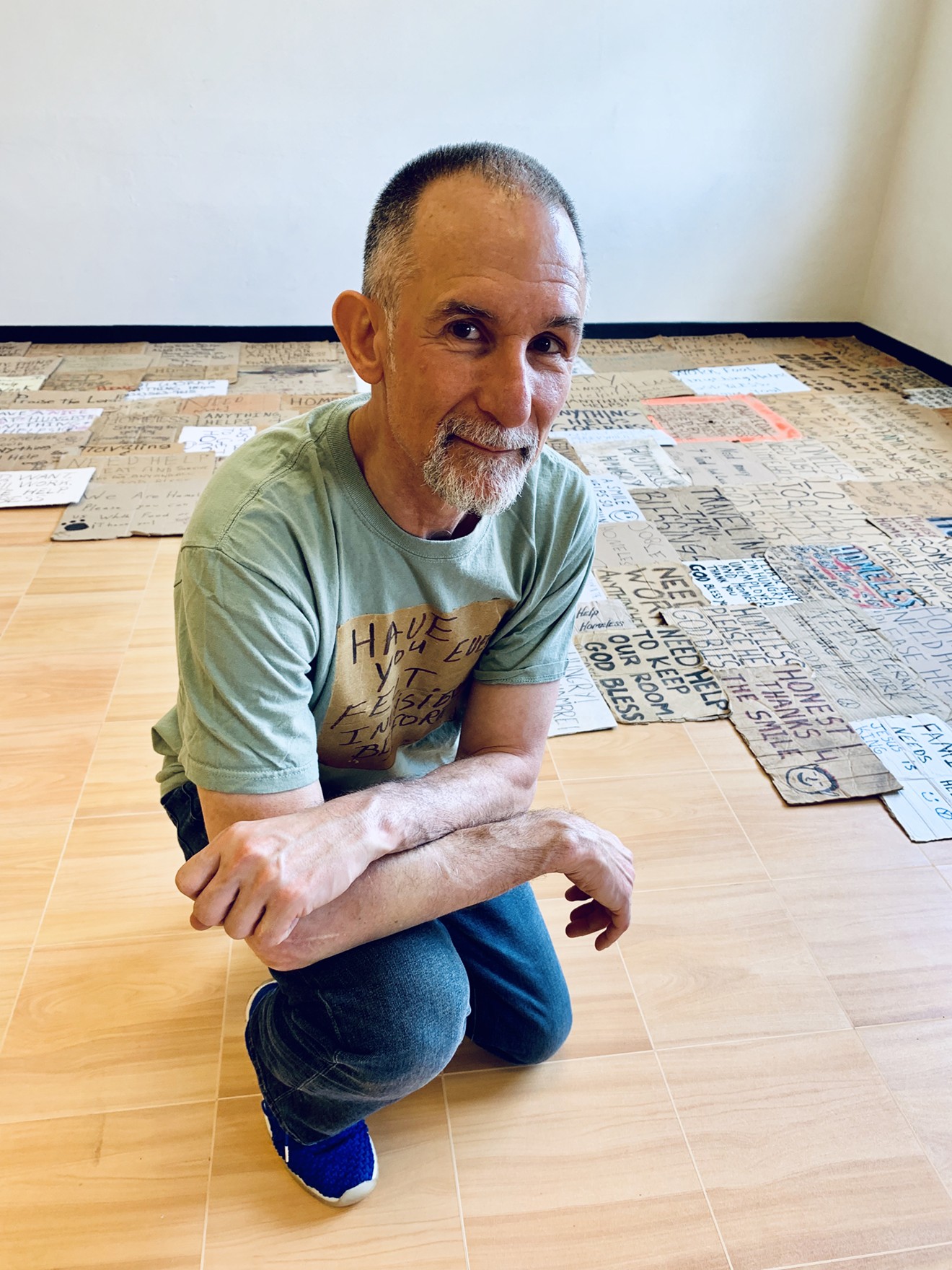“You’d see people holding signs. This was before cell phones, so at the time, you couldn’t pretend you were on the phone,” Baronet says. “I would pretend I was adjusting the radio, just anything to avoid eye contact. And I hated how that felt.”
He decided to do something about his own discomfort in the face of others' helplessness.
“That is when the idea occurred to me: I wonder if they would sell their signs?” says Baronet.
One day over 25 years ago, Baronet walked up to a homeless man and asked if he could buy his sign. And soon he bought the next one he saw and started a personal tradition.
“I try to let them set the price but it’s almost always between 10 and 20 dollars,” says Baronet. “Once I started, it completely changed the dynamic of how I saw them and how they saw me. We would shake hands, we would talk. It was like human beings actually connecting.”
In 2009, Baronet decided to start putting the signs he'd acquired on display for the public.
“I was doing art in grad school and I was trying to figure out what to do with these signs, and 2009 was the very first exhibit I ever had. I probably had hundreds of signs by that time,” Baronet says.
We told you about Baronet's project, WE ARE ALL HOMELESS, five years ago, but as time has gone on, his collection has increased with every sign he's come across. He says that as the signs seemed to close in around his living space, every aspect of his life felt like it was being buried in his collection. Now Baronet estimates that he has bought close to 1,800 signs from the homeless, which he keeps primarily at his art studio and home in Oak Cliff.
"I think they’re all really cool,” Baronet says of his collection. “It’s never ending. I think I’ve probably spent about $21 or $22,000, but it’s over a long time.”
Baronet’s efforts snowballed into an art project that has gained nationwide media attention. In 2014, he traveled across the country with a camera crew and filmed a documentary called Signs of Humanity, which he's hoping to release this year. Baronet’s ultimate goal is to see the project attracting the likes of major media figures like Stephen Colbert or Ellen DeGeneres.
“I realized I make up stories about people when I see them, which is human nature,” says Baronet. “And this project has taught me to be aware of that and to see them as human beings. That if I was in different circumstances, that would be me. It has really taught me to have more compassion. And it really has made me want to share this with other people.”
Baronet is a professor of creative advertising at Southern Methodist University who speaks at TED talks and at other schools and events across the country. His exhibits continue to gain attention around the world.
At the SMU art and design classes taught by Baronet and his colleagues, students and faculty often attempt to define art. One of the most common definitions, Baronet finds, is the concept of something qualifying as art when it has “stopping power,” grabbing your attention long enough to put your otherwise busy life on pause to take in the experience.
"There’s plenty of places to volunteer, plenty of places to donate. But first and foremost is wave, smile, let them know that you see them." — Willie Baronet
tweet this
Ironically, the sight of a homeless person holding up a sign often has the opposite of “stopping power,” as we hurry off on our ways in order to escape the moment. But the sight of hundreds of these signs strewn together has a breathtaking effect, and the capacity to make one wonder about what prompted the circumstances leading to their creation in the first place.
Some of the cardboard is now bent or wrinkled or falling apart in some way or other, with bold or shiny marker, some very faded. Some of the lettering is weak and scribbled. Some have pictures drawn on them, some have names. They come in various sizes. Some are painfully honest, and some flat-out hilarious: "HELP THIS PO-BOY GET A PO BOY," reads one sign embellished with a very good drawing of a po' boy sandwich.
"WIFE AND DOG KIDNAPPED BY NINJA’S — NEED $$$ FOR KUNG FU LESSONS. I’D REALLY LIKE THAT DOG BACK," or "OBAMA WANTS CHANGE I COULD USE SOME TOO."
Baronet could write a book with the stories he's amassed from his encounters. He offers a few of them as he looks through his signs, which he can't help but do without a critical designer's eye. He remarks that his idea for exhibiting the signs in large numbers came from the hope that the image would stir a sense of humanity in the viewer, inspiring them to take a second look at the next sight of a lone person with a sign.
The Washington Federal Bank recently gave $15,000 to WE ARE ALL HOMELESS to continue their classes on financial literacy. Baronet has also been working with Vogel Alcove in Dallas, teaching art workshops to children of marginalized families while the parents attend workshops from the bank. These are some of the many events Baronet organizes in conjunction with his art project.
He still battles the feeling that he hasn't done enough.
“I feel like wow … am I actually helping?” he says. But then Baronet remembers a Japanese proverb about an old man who saw millions of starfish stranded on a beach and then picked each one up and tossed them back in the ocean.
“And a little boy went up to him and said, 'What are you doing?'" Baronet says. "Do you see how much starfish there are? You can’t possibly make a difference. And (the man) says, I made a difference with this one." Baronet concludes: "And for me, you give 5 dollars to somebody on the street, that may be a meal they eat today. Every little bit does help. That’s all there are, lots of little bits.”
Baronet didn’t want to just freeze in an uncomfortable moment, he wanted to do his little bit.
“I think some people want to give money, some people are called to give food or water. Whatever you feel called to do beyond that is good. And some people get inspired and they start a clothes drive, all of that is good,” says Baronet.
“There’s plenty of places to volunteer, plenty of places to donate. But first and foremost is, see them. Wave, smile, let them know that you see them. That is the first step. Even if you don’t want to give them anything, that’s giving them something.”












